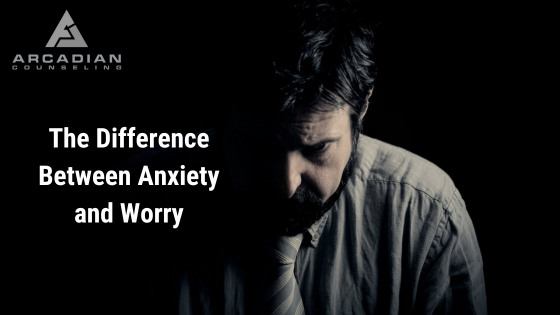Feelings of anxiety and worry are a common experiences for many of us these days. But often there’s confusion regarding the difference between anxiety and worry and their implications for mental well-being. Worrying is a natural response to life’s challenges. However, anxiety can be a more pervasive and debilitating condition. By understanding the differences between anxiety and worrying and exploring the potential benefits of anxiety, we can gain a deeper understanding of these complex phenomena.
Difference Between Anxiety and Worry

While anxiety and worrying may seem interchangeable, they represent distinct psychological processes with unique characteristics.
Worrying is a cognitive process characterized by repetitive thoughts and concerns about potential future events or outcomes. This typically involves dwelling on uncertainties, anticipating negative scenarios, and ruminating over perceived threats. While worrying can definitely be unpleasant and can lead to feelings of stress, it’s a normal aspect of the human cognition and serves adaptive functions, such as problem-solving and preparation.
Anxiety, on the other hand, refers to a broader emotional response characterized by heightened arousal, apprehension, and physiological symptoms such as rapid heartbeat, sweating, and muscle tension. Unlike worrying, which tends to be specific to particular concerns, anxiety is a more generalized state of distress that can persist even in the absence of identifiable triggers.
Anxiety disorders, such as generalized anxiety disorder (GAD), social anxiety disorder, and panic disorder, involve excessive and disproportionate levels of anxiety that interfere with daily functioning and well-being.
Why Worrying Isn’t Necessarily a Problem

Contrary to popular belief, worrying in moderation can be a normal and adaptive aspect of human cognition. Here’s a couple reasons why worrying isn’t inherently problematic:
- Preparation and Problem-Solving: Worrying can prompt individuals to anticipate potential challenges and take proactive steps to address them. By exploring various outcomes and devising contingency plans, worrying can actually enhance preparedness and resilience in the face of adversity.
- Motivation and Goal Setting: Healthy levels of worrying can fuel motivation and drive one to pursue their goals and aspirations. Concerns about future outcomes can serve as a catalyst for action, prompting individuals to work diligently towards achieving their objectives.
- Emotional Processing: Worrying allows individuals to process and make sense of their emotions, providing an opportunity for reflection and introspection. By expressing concerns and seeking support from others, individuals can gain perspective and find reassurance in times of uncertainty.
- Maintaining Safety and Security: Worrying can act as a protective mechanism, prompting individuals to prioritize their safety and well-being. Heightened vigilance and cautious behavior in response to perceived threats can help individuals avoid potential risks and navigate challenging situations more effectively.
While worrying can have adaptive functions, it is essential to differentiate between normal, manageable worrying and excessive, distressing anxiety that impairs daily functioning and quality of life.
Anxiety as a Catalyst for Growth

Although anxiety is often associated with distress and discomfort, it can also serve as a catalyst for personal growth and transformation. Here are some ways in which anxiety can be a positive force in our lives:
- Enhanced Performance: In certain situations, such as public speaking or competitive environments, moderate levels of anxiety can enhance performance and focus. The physiological arousal associated with anxiety can sharpen attention and concentration, enabling individuals to perform at their best.
- Heightened Awareness and Sensitivity: Anxiety can heighten our awareness of potential dangers and threats in our environment, prompting us to exercise caution and self-preservation. This heightened sensitivity can foster empathy and compassion towards others who may be experiencing similar challenges or vulnerabilities.
- Promoting Resilience and Adaptation: Overcoming anxiety-inducing situations can strengthen our resilience and adaptive capacities, bolstering our confidence and self-efficacy. By confronting and navigating our fears, we develop coping strategies and problem-solving skills that empower us to face future challenges with greater resilience.
- Catalyst for Self-Reflection and Growth: Anxiety can trigger introspection and self-examination, leading to greater self-awareness and personal growth. By confronting our fears and insecurities, we gain insight into our values, priorities, and aspirations, paving the way for meaningful self-discovery and self-improvement.
Understanding the differences between anxiety and worrying is essential for cultivating a healthy perspective on these complex emotional experiences. While worrying is a natural aspect of human cognition that can serve adaptive functions, excessive and uncontrollable anxiety can be debilitating and require professional intervention.
By reframing anxiety as a potential catalyst for growth and embracing worry as a normal aspect of our cognitive processes, we can navigate these emotional states with greater compassion, resilience, and understanding. Through self-awareness, self-care, and support from others, we can harness the transformative power of anxiety and worry to cultivate greater well-being and fulfillment in our lives.
James Killian, LPC is the Principal Therapist & Owner of Arcadian Counseling in Greater New Haven, CT where they specialize in helping over-thinkers, high achievers, and perfectionists reduce stress, increase fulfillment and enhance performance so they can move From Surviving To Thriving.

